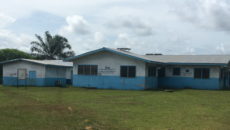Over the last year in Liberia, hundreds of children have come down with measles — a disease that is preventable with a simple vaccination.
Right now in Angola, a nation of over 21 million people in southern Africa, an outbreak of yellow fever is spreading across the country, with more than 500 cases and more than 175 fatalities. Yellow fever is also completely preventable with a single dose of a powerful and effective immunization.
In Guinea, a resurgence of Ebola cases has been reported, with five deaths during the month of March. A recent clinical trial of an Ebola vaccine shows promise, with high levels of effectiveness shown so far.
Numerous other deadly diseases can be brought under control with vaccinations to prevent diseases rather than having to treat them after people have become ill. Common diseases in Liberia which could be controlled with immunizations include hepatitis B, rabies, and mumps. Even cancer of the cervix in women can be prevented with a vaccine against the infection which causes it: human papilloma virus.
The discovery of vaccination goes back to 1794 in England, with the discovery of a vaccine to prevent smallpox. Edward Jenner observed that women who milked cows on farms and had caught the milder disease of cowpox were protected from contracting smallpox. He performed an experiment and scratched some cowpox material into the skin of an 8-year-old boy.
He later intentionally exposed the boy to smallpox, but he was protected from it. This discovery led to the control of smallpox across Europe. Nearly a century later in France, Louis Pasteur developed the first vaccination produced in a laboratory to prevent rabies in dog bite victims. The 20th century saw the development of more vaccines: from diphtheria (1923) to tetanus (1927), to polio (1955) to measles (1963).
There is a simple concept behind vaccination: the body’s immune system can be trained by vaccines to fight successfully against many diseases. We use a vaccine to expose the body’s white blood cells to a killed or weakened the infectious agent, and thus, we teach the immune system to recognize the germ before it has to fight the real infection for survival.
In a sense, using a vaccine is like hiring a spy to get secret information about your enemy before a battle; when you know exactly where and how the enemy is going to attack you, you can prepare your defenses and improve your chances of winning.
For example, the measles vaccine contains a living virus that has been weakened in the laboratory. The white blood cells fight against this weak vaccine strain of measles and thus learn to recognize and fight against the wild measles virus. All vaccines may cause side effects like fever, body aches, or rashes — after all, they are getting the immune system trained to fight an infection. But the risk of serious side effects is quite low.
Presently in Liberia, children have access to routine immunizations against nine diseases: tetanus, diphtheria, whooping cough, hepatitis B, hemophilus influenza (a bacteria which causes meningitis), pneumococcus (a bacteria which causes pneumonia and meningitis), polio, measles, and yellow fever.
Children who receive all these vaccines will be protected not only against infections like tetanus and measles, but against liver cancer later in life which is caused by chronic hepatitis B infection.
During the Ebola epidemic, many people were afraid to go to hospitals and clinics to receive vaccinations, or the local clinic had closed its doors. Because of this, many children did not receive their routine vaccinations. Large numbers of children have no immunity against measles and are thus vulnerable to this disease. Initially, measles causes fever, rash, and cough. Late complications include pneumonia and death. The Ministry of Health is carrying out measles vaccination campaigns to try to get more children vaccinated.
It breaks my heart to see children dying of measles in Liberia today when the disease can be prevented by a single dose of a simple vaccine. Be sure to bring any child who has missed their measles vaccine (age 6 months to 5 years) to be vaccinated right away!
In the United States over the last 50 years, we have seen marked decreases in the rates of measles and meningitis. Not only that, more recently we’ve seen decreases in the risk of cervical cancer and liver cancer as routine vaccination with HPV vaccine and hepatitis B vaccine have been instituted.
Most Liberians think vaccinations are only for children and pregnant women, but some of them are very important for adults. For example, healthcare workers should be vaccinated against hepatitis B to protect against occupational exposure to the disease. Please take advantage of all the vaccines available to you, and continue to push for more vaccines to be brought to Liberia!
Featured photo courtesy of UNICEF



